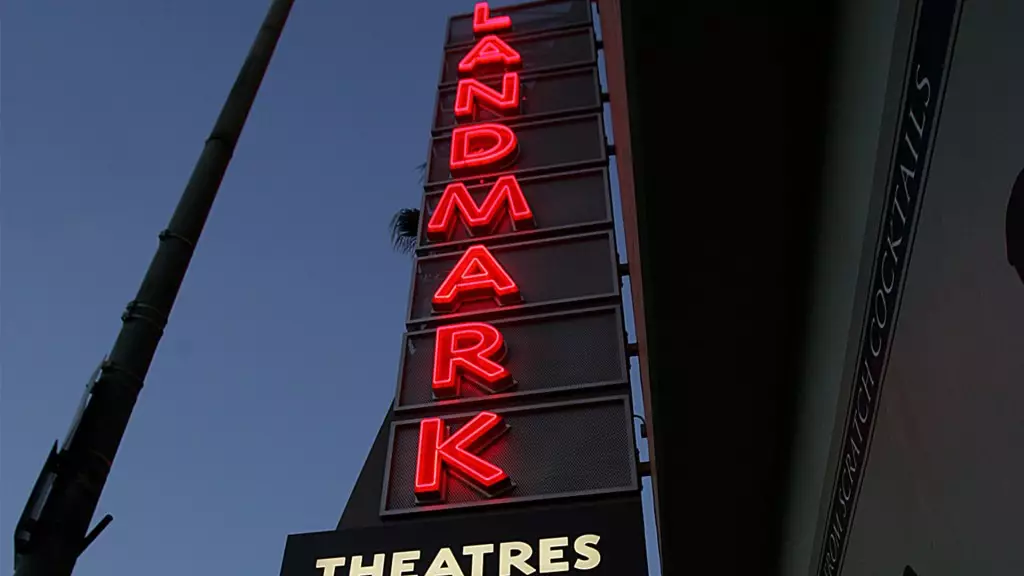In recent years, the cinematic landscape has undergone unprecedented challenges, significantly affecting various theater chains, including Landmark Theatres. The multifactorial strain stemming from the pandemic, soaring interest rates, and ongoing labor strikes in Hollywood has plunged Landmark into a financial abyss, with losses reportedly amounting to hundreds of millions of dollars. The situation escalated to the point where Landmark’s owner, Charles Cohen, found himself embroiled in legal disputes with Fortress Credit Corp., the lender that financed his acquisition of the chain. As the theater market struggles to regain its footing, Landmark stands as a case study in the complexities of navigating contemporary cinema economics.
The crux of the situation emerged in a deposition filed in New York State Supreme Court, where Cohen disclosed the severe decline in Landmark’s value, directly attributing it to the various macroeconomic factors impacting the industry. As theaters faced prolonged closures during the COVID-19 pandemic and film productions came to a standstill due to the strikes of writers and actors, Landmark’s financial health deteriorated significantly. Cohen’s acknowledgement of “negative $14 million net revenue” further underscores the precarious state in which the chain currently finds itself.
As financial pressures mounted, Cohen faced a court ruling declaring that he had defaulted on a significant loan, resulting in a looming auction of Landmark properties set for November 8. The implications of the litigation are profound, not only for Cohen but also for the future of Landmark Theatres. With a separate instance revealing that Cohen is personally liable for a $187 million loan guarantee, the stakes could not be higher. Fortress has raised pertinent concerns regarding the potential outcomes of the auction, suggesting that proceeds from the sale may not even cover the debts owed.
In the wake of these events, Fortress sought to restrict Cohen’s ability to manage his assets in a manner that would impede their recovery efforts. Their request for a judicial order aims to prevent Cohen from transferring or selling assets, citing concerns over significant value-altering transactions, such as transferring properties and luxury assets to shielding trusts. This contentious atmosphere reflects a battle not just over money, but control—control of Landmark’s future and the broader implications for cinema in an era of uncertainty.
Prior to the financial downturn, the cinema sector was already adapting to a shifting landscape in audience engagement and consumption patterns. The emergence of streaming platforms and changing viewer preferences have forced traditional theaters to rethink their strategies. Landmark Theatres, known for its focus on arthouse films, has also begun to adjust its programming in hopes of revitalizing receipts by mixing independent films with mainstream blockbusters, similar to strategies employed by competitors like Alamo Drafthouse.
Moreover, as theaters struggled to attract audiences post-pandemic, a greater emphasis on experiential elements has arisen. Many chains are now investing in enhanced viewing experiences—upgraded seating, gourmet dining options, and modernized décor—as a way to lure customers back into theaters. Cultivating a dynamic atmosphere that attracts younger audience segments seems essential for Landmark and others to reclaim their market share. Yet, with financial constraints looming, the challenge lies in striking the right balance between innovation and fiscal responsibility.
Looking Ahead: The Stakes of the Upcoming Auction and Potential Resolutions
As the deadline for the property auction approaches, negotiations between Cohen and Fortress remain critical. There are indications that Cohen is hopeful for a settlement solution that would avert further loss and allow Landmark to continue operating. The possibility of an agreement would not only be vital for Cohen but also for the emblematic status Landmark holds within the independent cinema community.
However, the landscape remains uncertain. The impact of theater closures and cultural shifts during the pandemic has led audiences to more adaptable viewing habits, placing additional pressure on traditional theaters to pivot quickly. If successful, Landmark could harness its legacy within the arthouse sector to carve out a niche amid a more holistic cinematic experience that draws audiences back to the theater environment.
The story of Landmark Theatres is emblematic of the broader struggles within the film exhibition industry. With litigation, economic pressures, and evolving viewer preferences at the forefront, the coming months are pivotal. Whether Landmark can successfully navigate these tumultuous waters will not only determine its fate but potentially serve as a bellwether for the entire cinematic ecosystem in the wake of catastrophe.

